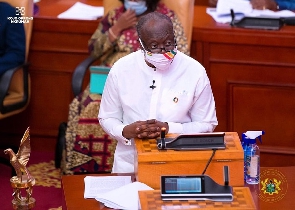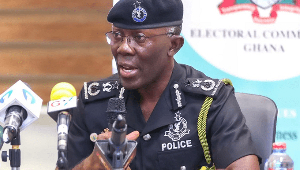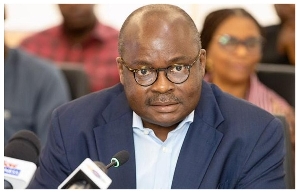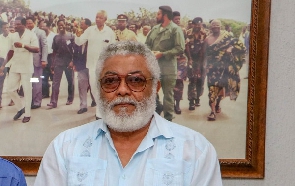Ghana’s Finance Minister, Ken Ofori-Atta, as per Section 28 of the Public Financial Management Act, 2016 (Act 921) presented the 2020 mid-year budget review and supplementary estimates for the financial year in Parliament on Thursday, July 23.
The presentation of the budget review by Mr. Ofori-Atta touched on key economic indicators such as growth rate, primary balance, budget deficit, revenue and expenditure targets among others.
Main essentials of the budget focused on key areas with the expressed object-target towards the growth and development of the economy. Some of these areas included; a robust financial sector, education, agriculture, job creation, infrastructural development, Health, among other relatable COVID -19 support goodies.
It is patently evident from the mid-year budget review presentation that, under the dispensation of this government led by His Excellency Nana Addo Dankwa Akufo-Addo, the financial sector, including Micro Economic indicators have improved significantly and positively over the period.
Most significant of them is the financial sector clean-up; it has brought some sanity and whipped up the confidence of the general public, as regulatory agencies are working effectively to ensure banks and other financial institutions are in good standing and operating within the remits of regulatory requirements in order to serve the general public without any liquidity challenges.
Paradoxically, some people may argue that people lost their jobs as a result of the financial sector clean-up exercise, but on the other hand, it has also given the working class within this sector the opportunity to test other waters and venture into other business opportunities through entrepreneurial exploits.
The cleanup was necessary to safeguard the ordinary Ghanaian and also ensure that the sector is able to meet all regulatory requirement and market standards. We have witnessed regular reductions in the Monetary Policy Rate and this goes a long way to reduce the cost of credit. Policy rate was reduced by 150 bases point to 14.5% in March.
The Monetary Policy Committee in their meeting which ended on the 24th of July 2020 is expected to either maintain the rate at 14.5% or reduce it marginally considering the current economic climate of the country and the world at large.
Inflation under this current government has seen inflation rates decline from 17.45% in 2016 to 7.18% as at the end of 2019. The end of 2019 inflation rate also outperformed other African countries such as Nigeria (11.40%), Zambia (9.15%) and Angola (17.15%). Inflation rates saw a surge this year to end June at 11.2% from 11.30% in May. This surge was as a result of the Coronavirus (COVID 19) Pandemic.
The pandemic disrupted economic activities created uncertainties, and weakened global growth conditions. Data for the first quarter of 2020 showed a sharp contraction in economies most affected by the COVID-19 pandemic, partly reflecting the effect of public health countermeasures implemented to slow the spread of the virus.
The global economy is therefore projected to contract by 3.0 percent in 2020 under the baseline assumption that the pandemic slows in the second half of 2020, and containment measures gradually ease across most countries (IMF, April 2020 WEO).
Before and during the lockdown periods (March and April), the cost of food prices on the market went up significantly. This was as a result of higher demands for food products in general. However, this cannot be said of the previous government where the inflation rate was mostly on the high. Inflation rate moved from 7.13% in 2012 to 17.45% in 2016.
Below is a data for inflation rates from 2012 to 2020

The President promised Ghanaians a Free SHS in his bid to become a President of the Republic and this has been fully implemented and executed. A total of GHS 3.2 billion has been invested and as a result, about 1.2 million teenagers have benefited from this initiative. The scheme has also witnessed 266 classrooms block dormitories, toilet facilities have also been completed. This outnumbers the classroom blocks completed during the tenure of the previous government. Financial burdens of parents and guardians of these 1,199,750 teenagers have been lifted and also given room for the underprivileged teenager to be in school.
The Agricultural sector sometime in the past was the backbone of the Ghanaian economy contributing to the GDP growth rate. This died off until the current leadership saw the essence of how this sector is of high importance to the growth of the economy.
The government has since invested over GHS 1.85 billion in this sector from a low of GHS 181 million. The modernization of the agricultural sector by the current leaders of the economy has seen 1.5 million farmers enrolling for the initiative launched by His Excellency the President of the Republic of Ghana under the “Planting for Food and Crops” initiative and created jobs for 2.2 million Ghanaians. Also, 7,141 hectors of land have been developed for various irrigation systems.
Still on the Agricultural sector, a total of 17 warehouses with 1000MT capacity have also been built, with 13 under construction. Farmers have also been supplied with 6,270 units of agricultural machinery and equipment. The implementation of the Green House villages has seen 296 graduates trained in the greenhouse vegetable production as at the end of 2019 and 61 trained so far in 2020; 119 youth have been identified and yet to be trained.
These initiatives have helped shaped and given the Agricultural Sector a face-lift and seen a lot of graduates shift their attention from white-colour jobs to the agricultural sector and has seen the sector contribute to GDP. Agriculture contributes to 54 % of Ghana’s GDP, and accounts for over 40 % of export earnings, while at the same time providing over 90 % of the food needs of the country. (SRID, 2001).
During the address to parliament and the nation on Thursday, the Finance Minister indicated that a number of the working force both in the formal and informal have lost their jobs during this COVID 19 pandemic. Thus the government has instituted an Unemployment Insurance Scheme to relief citizens of their financial burdens. Other developed countries like Germany and the United States of America have had similar packages for citizens that lost their jobs. This, however, cannot be said of other African countries. Ghana led by this current administration despite the high expenditures, included this in the budget to cushion citizens both in the formal and informal sector.
Job creation and employment opportunities cannot be underplayed in the history of Ghana under the leadership of His Excellency President Nana Addo Dankwah Akufo-Addo. The National Builders Corps (NABCO) after its establishment has changed the status of over 100,000 Ghanaians especially graduates from unemployment to gaining full employment status. Processes are underway for people in the informal sector whose business have been affected by the pandemic to have access to loans at lower interest rates through the NBSSI. Several Ghanaians have applied and payments been processed and commenced same.
Apart from the above, 190,000 young people have been trained under the National Entrepreneurship Innovation Program with 4,350 funded; this has created 90,000 jobs directly and indirectly. People with disabilities have also been given utmost support under the watch of His Excellency the President Nana Akuffo Addo. A total of GHS 2.0 million has been earmarked for 1,000 male entrepreneurs under the Presidential Empowerment for Male Entrepreneurs with disabilities.
Finally on job creation and employment strategies; 97,876 individuals within the small scale enterprises have benefited from MASLOC.
Regarding infrastructure, the introduction of One District – One Factory (1D1F) has seen 232 projects at various stages of implementation; 76 completed, 156 under construction with 154 districts benefiting. This has created jobs for a lot of Ghanaians directly and indirectly.
Aside 1D1F, the railway sector has also seen a face-lift with sections of Accra – Tema (30km) and Achimota-Nsawam (33km) while that of Kojokrom – Takoradi has been rehabilitated. A standard-gauge 56km of a 97km railway track laid for Tema has been completed. The government has also commenced the construction of a 300-metre railway bridge across the Volta River and a new standard gauge for the Western line (Thus from Takoradi to Kumasi) has also commenced.
All these infrastructural projects have been implemented in less than four years under the leadership of His Excellency the President.
Most countries, both developed and developing have been exposed to the weakness of the health system and Ghana is no exception. However, the President in one of his addresses to the Nation stated the government’s decision to build 88 hospitals across the country. Ghana’s first Infectious Disease Isolation and Treatment Centre was commissioned on Friday 24th July 2020 by His Excellency the Vice President, Dr. Mahamud Bawumia. A 600-bed Regional Teaching Hospital is set to be built in the Eastern Region worth $80.5million. However, in the same vein, the previous government spent $250 million to upgrade and rehabilitate the Greater Accra Regional Hospital with 420 beds capacity. It is clear that the government is and has been prudent in its expenditure spendings.
Health workers especially frontline workers have also been given some tax exemptions from their basic salaries as a form of incentive and motivation as they continue to put their lives at risk saving thousands of Ghanaians from the COVID 19 virus. Free Transportation, free Personal Protection Equipment’s (PPE’s) have been provided for all regional and district hospitals and some selected private hospitals.
Finally, the Finance Minister in his address, indicated that free water and electricity has been extended for three more months, reduced communication tax from 9% to 5% for all Ghanaians as part of efforts to reduce the effects of the COVID 19 pandemic on the public.
This economic stimulus package is definitely going to reduce the cost of living for most citizens, and the process is simple, fair and transparent. Comparing this to other African countries such as Nigeria, Ghana has done relatively well. The Nigerian government, for example, has established a COVID 19 related relief package that is subjected to approval by the Central Bank as part of the cumbersome processes that defines ones eligibility for consideration. In Ghana, these reliefs cover every single Ghanaian (Both the rich and the poor)
In conclusion, facts have proven that the Government led by His Excellency Nana Akufo-Addo has led and is leading the Ghanaian Economy to the Promised Land. All key highlights in the 2020 midyear budget presented by the Minister for Finance, Hon. Ken Ofori-Atta clearly shows that amidst the COVID 19 pandemic, where several nations have been hard-hit, Ghana has prioritized the wellbeing of her citizenry, the health sector, agricultural sector and infrastructural development.
Opinions of Tuesday, 28 July 2020
Columnist: Palgrave Boakye-Danquah



















